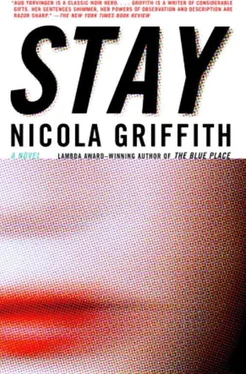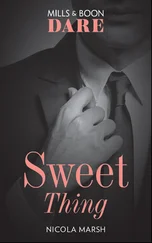I worked quickly. It didn’t take long. “There,” I said, and sat back. It was the Mexico City cathedral. She was riveted. “If you like, we can copy that over, use the image, the picture, for cathedrals in the game.”
She nodded mutely. I kept a small window open in the top left of the screen for her to look at while I got back to SimCity.
“Now, see, we paste this into here, and look, there it is.” A tiny cathedral in the middle of downtown SimCity.
“Not there. Here,” she pointed to a park. Quick look to see what Button was up to. He had abandoned the paper clip and was examining the hinge on a cabinet door. “It should go there, on this side. And there should be government edificios on the other side.”
Just like Mexico City, where the Catholic cathedral, built on the ruins of an Aztec temple, faced government buildings across a huge plaza. Maybe one day I’d tell her about Montezuma’s palace.
“You do it,” I said. I showed her how to work the touch pad. Her fingers weren’t used to machine ways, but after a while she got the hang of it. She moved the cathedral.
Button was trying to dismantle the stove, but I had disconnected the propane before leaving North Carolina, so I didn’t worry.
“How do I make buildings?”
“You have to pay for them.” I showed her how, and she set to work with a curiously bland face, no frowns of concentration or lip caught in her teeth.
Button started in on the fridge. I distracted him with the remote for the TV, and while he sat, fascinated with the changing pictures, Luz played god, or at least mayor.
“What are taxes?” she asked after a while.
I thought for a minute. “The government’s tithe.”
“Oh.” Ten minutes’ silence while she put in too many parks, stroked the leather carrying case absently, hummed tonelessly under her breath, checked once or twice to make sure Button was still amused by his own toy, and finally turned to me for help. “There’s no money left.”
“You’ll have to demolish some of those parks.”
She frowned. “Parks are nice.”
“Yes. But there’s no point having them if everyone’s leaving.”
Fidget. Check on Button again. Sideways look. I just waited. “So what should I do?”
“Hard choice. Demolish the parks or have an empty city.” I knew which I’d choose.
“No.”
“They’re your only choices.”
“No.”
“No?”
“No.”
“Well then, you’ll have to cheat.”
Consternation. Cheating was probably not much encouraged by the Plaume City Church of Christ congregation. Aud as devil’s advocate.
“You don’t like that idea?”
She shook her head.
“Why not?”
“Cheating’s bad.”
“Who says?”
“God.”
“Where does it say that in the Bible?”
Thoughtful look.
“Is there a commandment against it?”
She ran through the commandments in her head. “Thou shalt not bear false witness?”
“You don’t actually have to lie. You just sort of step around what everyone expects. It depends, of course, on what you want from the game.”
“People and parks.”
“Yes, but do the ends justify the means?” Incomprehension. How old did children have to be before you could talk to them as real human beings? I tried again. “Sometimes people play this game to test how clever they are: to see how many people and parks they can make without cheating. And sometimes people use it to just play, to have fun, not as any kind of test: just to build things, to see how they look.” All about perspective.
“People and parks,” she said again.
“Then watch.” I tapped in call cousin vinnie . “Now, you see that window—that man offering free money if you’ll just sign his petition?” She nodded. “If you go ahead and take that money, it’s yours, no strings attached.”
“For nothing?” Not so much a question as an expression of skepticism.
“Yes and no. Now watch, see what happens if you don’t take the money and type in this extra code.”
I entered zyxwvu .
“Oh!” she said as the beautiful SimCity castle appeared.
“That boosts land prices, which—”
The trailer filled with the blatting of a sell-sell-sell commercial for cheap furniture: Button had discovered the volume control. I had to get up to turn it down manually. I swapped to a channel with strangely colored cartoon characters running about doing impossible things, and recorded three minutes of it. Then I showed him how to play back: freeze frame, slow motion forwards, backwards, jump back to real time. He loved that, making the characters go backwards and forwards, backwards and forwards. He giggled: a strange, grown-up sound.
Luz was looking fixedly at the screen again. “What’s that?” She pointed to a farm on the outside of her city.
“Ah. Crop circles.”
Before I had to try explain to a nine-year-old Christian fundamentalist some computer geek’s in joke about alien visitors and crop circles, Adeline knocked on the trailer wall and called, “Miz Thomas? If you’d send the children out, then step into the house when convenient, I’d be grateful.”
Hjordis’s house in Oslo is filled in the afternoons with sunlight. In the evenings and during winter, she burns a score of candles to soften and lift the dark that flattens even the best artificial light. Her living room feels alive; it seems to dance. By contrast the Carpenters’ front room, with its thick brown curtains, umber wool rug, and heavy furniture, felt stiff and formal, but Hjordis would have understood immediately the ritual aspects of the gathering: to the right of the fireplace, Jud sat in a wing-backed chair turned slightly to face the upholstered sofa, where I sat in a carefully nonconfrontational pose, briefcase tucked out of sight. Adeline’s chair faced Jud’s across the fire, turned to give him all her support.
Jud wore his Sunday best for a second day in a row. I don’t know what Adeline had told him about me and my reasons for wanting to give them money every month, but he treated me as though I were the nineteenth-century son of his employer, come to ask for the hand of his daughter in marriage. He was not in a position to say no, but the forms must be observed.
He cleared his throat. “Miz Thomas,” then stopped. I could feel Adeline willing him on. “Be obliged if you would listen.” I nodded. He took a handwritten document from his inside breast pocket and stood, and began to read, as though it were a church lesson: seven hundred and fifty dollars a month, payable to J. Carpenter, in advance, on the first of every month; a day school to be agreed upon, Luz to attend, extra items such as uniforms and school equipment to be paid for by me; Luz to be kept clean, well fed and clothed, and happy, “loved as best we’re able, as if she were family.” Luz’s legal documents to be kept by my lawyer, and a letter received from said lawyer confirming that fact. Luz to remain with the Carpenters while she was a minor. If my payments were more than thirty days late, the Carpenters were to receive the legal documents, and the agreement was rendered void. If they broke the agreement, they would surrender Luz.
He sat down, still holding the paper in both hands.
In my briefcase I had a sheaf of crisp photocopies and printouts, and Bette’s impregnable legal draft. None mentioned love or family or happiness.
“May I see the paper?” I said.
He stood, handed it to me, sat.
There were several blank spaces I was obviously meant to complete, and a place to sign at the bottom. Under name, “Aud Thomas” had already been filled in. It was a feminine hand, Adeline’s, though she was acting as if she had nothing to do with the proceedings, resolutely refusing to catch my eye when I looked at her. There was nothing about visitation rights, or lack of them.
Читать дальше












